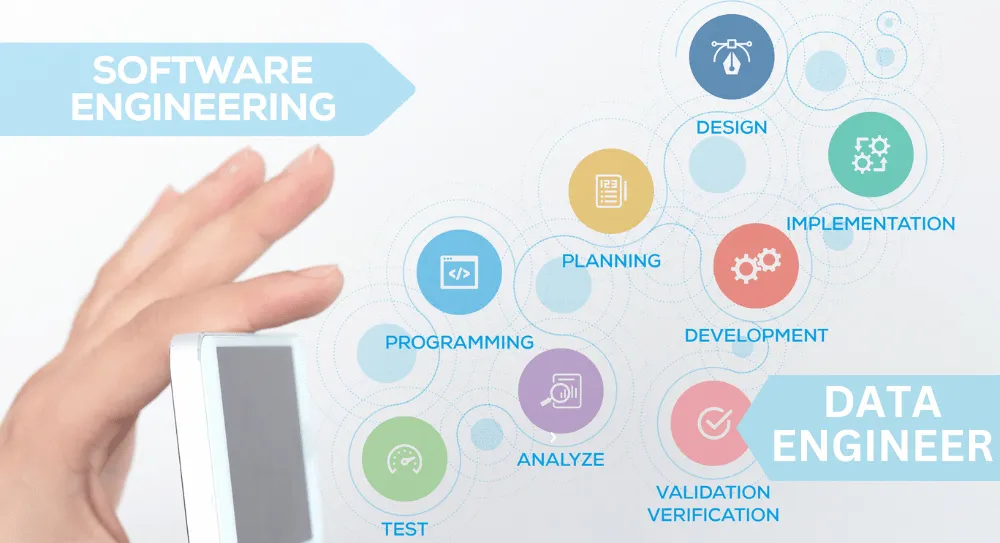Data Engineer vs. Software Engineer: Which is Better?
By TOI Staff
June 14, 2023
Update on : June 14, 2023

Businesses need professionals that can manage massive amounts of consumer data, competitive research, and product performance statistics as the world consumes more and more data. In order to create and maintain their increasingly complicated websites and apps, they also require qualified developers. Data engineering and software engineering are two intriguing tech fields that were born out of these two separate needs. Although they occasionally overlap, the two actually specialize in different fields.
What is a Data Engineer?
A data engineer is a member of the software engineering team who is responsible for designing, developing, and maintaining data-driven applications. They work with business analysts and data scientists to develop and implement data-driven solutions that improve the performance and reliability of the company’s systems. They also work with developers to design and implement data-driven architectures and data-driven solutions that meet the specific needs of the business. Sounds interesting? Consider earning a Data Engineering Certification to launch a fulfilling career.
What is a Software Engineer?
Software engineers are professionals who are responsible for designing, writing, testing, and maintaining the source code, or computer programs, that run on computer systems. The job of a software engineer is very broad, and they usually work with other people in teams to come up with solutions to problems. Software engineers can be found in many different industries and use their skills to create programs for all sorts of purposes.
Skills Required
Data Engineer
Coding/Programming Languages: For every data engineering position, having programming language knowledge or coding skills is a significant need. Many organizations demand that potential employees possess at least a fundamental knowledge of programming languages like Python, Java, C++, Scala, .NET, R, Shell Scripting, Perl, and others.
Data Warehousing: The task of storing and evaluating a massive amount of data belongs to data engineers. Data warehousing helps data engineers combine unstructured data that has been gathered from many sources. In order to increase the effectiveness of corporate operations, it is then contrasted and evaluated. It is, therefore, essential to be conversant with and have experience using data warehousing technologies like MarkLogic, Oracle, Amazon RedShift, etc.
Data Structures: Data engineers must be proficient in data structures because they make it possible to organize and store data for simple access and manipulation. Therefore, it is advantageous to have a solid knowledge of database design and architecture.
Machine Learning: Using data from the past and the present, a machine learning system can help you anticipate outcomes in the future. Data engineers may find it useful to have at least a fundamental understanding of working with this kind of data. Understanding machine learning will enable you to better comprehend the needs of your firm and create more accurate data pipelines.
Database Systems: Data engineers need to be proficient in a variety of technological areas, including SQL and NoSQL database systems. For the storage and retrieval of information, they should be able to work with and alter database management systems (DBMS). The main computer language used to manage and build relational database systems is SQL. However, NoSQL databases are not tabular and come in a variety of forms depending on the data type. It takes more than simply memorization to learn SQL. You must become proficient at running efficient queries. Having knowledge of MongoDB, Cassandra, Big Query, and Hive are some extra SQL talents.
Data Analysis: The majority of businesses demand that candidates for data engineering positions have a solid understanding of analytics and software that supports analytics, particularly solutions based on Apache Hadoop, like MapReduce, Hive, Pig, and HBase. The open-source platform Apache Hadoop is employed to perform distributed processing and dataset storage. They provide a variety of tasks, including processing, access, storage, governance, security, and operations for data.
ETL Tools: ETL tools, sometimes referred to as an extract, transfer, and load tools, are a class of technologies that gather, read, and transfer unprocessed data from various sources into a database. It is essential that data engineers have the ability to use this procedure to extract the appropriate data for analysis and solution of a particular business problem.
Software Engineer
- Excellent command of a variety of programming languages, including Java, C, C++, JavaScript, and other well-known ones.
- Strong analytical abilities to evaluate intricate technical data and business requirements.
- The capacity to debug and proficiency in resolving software problems.
- Having expertise in constructing software applications and being proficient with software development tools and platforms
- Possess knowledge of UI Toolkits and frameworks
- The capacity to draft exact, thorough technical documentation.
- Software design, documentation, and testing skills
- Backend development skills
- Good research skills
Responsibilities
Data Engineer
- Gather, Examine, and Arrange Raw Data in accordance with Business Needs
- Create, test, and manage data pipeline and system architecture
- Sync up architecture with the company’s needs
- Recognize the requirements and goals of the business
- Create techniques to turn data into information that can be used to take action
- Determine how to increase data quality, efficiency, and reliability
- Find tasks that can be automated using data
- Create prototypes, algorithms, and analytical tools
- Examine current trends and patterns
- Identify potential data-acquisition opportunities
- Create data set procedures
Software Engineer
- Carry out the software development life cycle
- Project planning and execution
- Design test cases and technical specs
- Analyzing system risk and reliability
- Update, diagnose, and repair current systems
- Assure your software has the most recent features.
- Examining and evaluating new technology before implementing them
- Launch programs and analyze user comments
Salary
Data Engineer salary in India ranges between ₹ 4 Lakhs to ₹ 21.0 Lakhs with an average annual salary of ₹ 8.2 Lakhs, according to Glassdoor.
Software Engineer salary in India ranges between ₹ 3.0 Lakhs to ₹ 14.0 Lakhs with an average annual salary of ₹ 6 Lakhs.
Conclusion
You could be better suited for a data engineer position if you’re passionate about creating and maintaining data systems to accomplish company demands or goals. A career as a software engineer may be more appealing if you prefer working in teams to create systems, apps, or websites.
We’ll see greater collaboration between data engineers and software engineers as data becomes increasingly essential to almost all software or application solutions. Although software developers and data engineers still have separate objectives, both engineering disciplines will contribute to the final product.
Read more: Data Engineer vs. Software Engineer: Which is Better?















